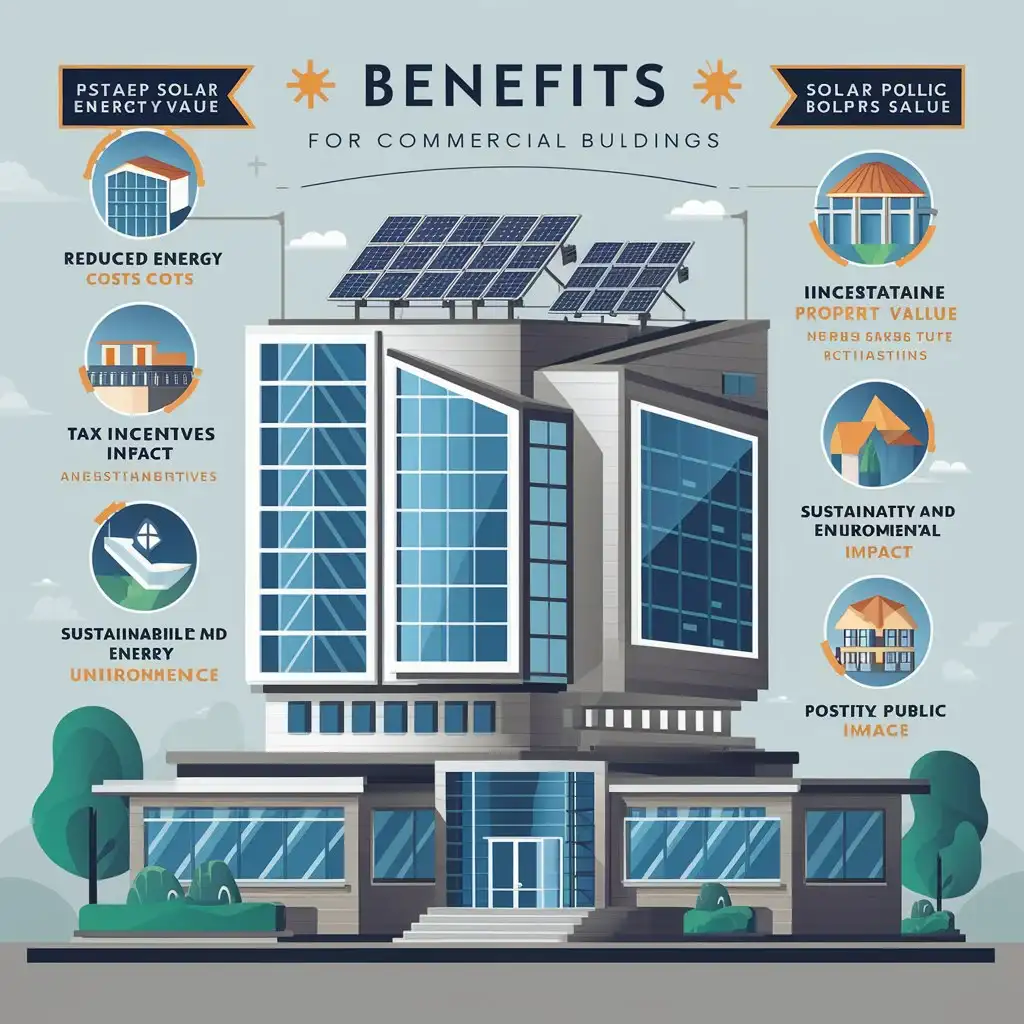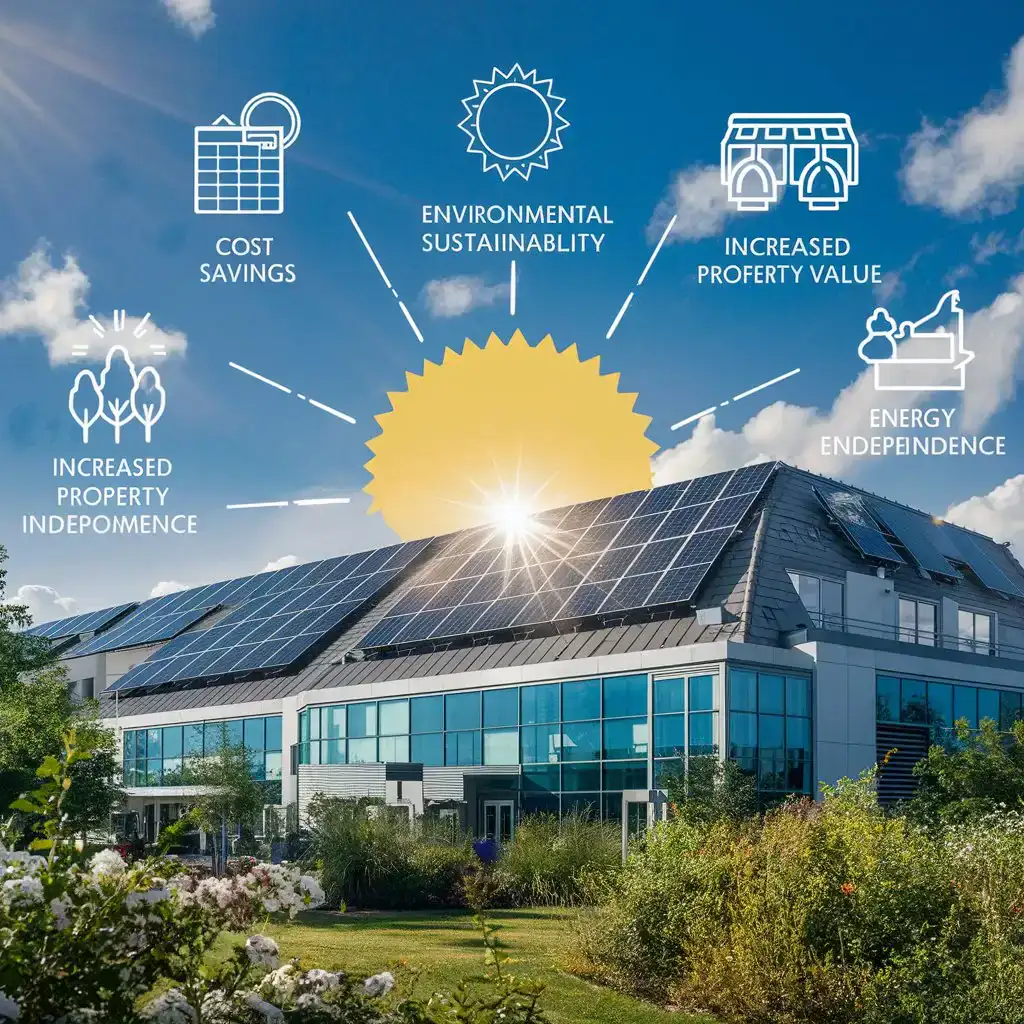Top 8 Benefits Of Solar For Commercial Buildings
Electricity prices in the U.S. are increasing, making it difficult for businesses to budget and plan for the future. However, solar panel prices have decreased significantly recently because the technology and manufacturing processes have improved.
Solar power has been growing rapidly since 2010. The average annual growth rate is 33%. This information comes from a recent report by the SEIA. Lower costs, tax credits, and increasing demand for clean energy from private and public sectors drive this growth.
The country has installed over 130.9 GW of solar power, providing electricity for 23 million homes.
In 2021, solar power made up 46% of new electricity added to the grid, the highest percentage ever seen. Solar power is becoming more competitive with other energy sources. SEIA says solar power now makes up over 4% of U.S. electricity, up from just 0.1% in 2010. During the same period, the cost of installing solar systems has dropped by more than 60%.

How Solar Energy Works
Solar energy captures sunlight and converts it into usable energy through different methods, some more efficient than others. Today, solar panels can turn 20% of the sun into energy, making them a good choice for powering businesses.
Layers of silicon cells in glass make up a solar panel. It also goes by the name solar module. The panel has a metal frame and wiring to carry electricity from the silicon.
Silicon has special properties that allow it to absorb sunlight and convert it into electricity. When sunlight hits the silicon cells, it causes electrons to move, generating an electric current.
The photovoltaic effect, first discovered in 1839, involves three main steps:
- The photovoltaic solar cell absorbs sunlight, harnessing its energy.
- Sunlight makes electrons move in the silicon cell, creating direct electric current (D.C.).
Wires carry D.C. electricity to the solar inverter. The inverter converts the electricity to A.C. power. Homes and businesses then use this power.
Using solar energy efficiently is great, but storing more for extra power is challenging. This challenge has sparked research for improved energy storage like batteries and new technologies to enhance solar power’s potential.
Top 8 Benefits of Solar Energy for Commercial Buildings
Certainly! Let’s delve deeper into each benefit of installing solar panels for commercial buildings:
1: Saves Money, Cuts Operational Costs:
Electricity bills can significantly burden commercial buildings, eating into operational budgets. Businesses can save money in the long term by using solar energy instead of only using grid electricity. Installing solar panels may cost a lot initially, but you’ll save money on energy bills in the long run.
Return on investment (ROI) saves money and helps businesses make more profit by using resources better.
2: Increases Property Value:
Property buyers and investors highly value energy efficiency in today’s market. Installing solar panels enhances the energy efficiency of commercial buildings, making them more attractive to potential buyers or tenants. Properties with solar panels often command higher selling prices and can sell more quickly than those without.
Solar panels increase property value, making them a smart investment for building owners and promoting the use of solar energy. Solar panels help reduce costs and carbon footprints by making buildings more energy efficient. This aligns with sustainable business practices and environmental stewardship.
3: Access to Tax Breaks:
Federal tax credits, such as the ITC and PTC, help businesses, nonprofits, and local governments save money on solar energy investments. These tax credits are beneficial for reducing costs associated with solar energy systems. They provide financial incentives for organizations to invest in renewable energy.
Overall, these credits help promote the use of solar energy and support sustainability efforts. Tax incentives lower costs for businesses to switch to solar power by reducing upfront expenses for installing solar panels. Additionally, state-level incentives and utility rebates further sweeten the deal, providing additional savings opportunities for businesses investing in solar.
4: Environmentally Friendly and Builds Brand Image:
Solar energy helps the environment by reducing greenhouse gas emissions and dependence on fossil fuels, in addition to providing financial benefits. Businesses that embrace solar energy demonstrate environmental stewardship and corporate social responsibility, which resonates with environmentally conscious consumers. A strong brand image can make customers loyal, attract eco-friendly clients, and differentiate a business from competitors. Investing in solar panels benefits the environment and strengthens the reputation and credibility of commercial brands.
5: Protection Against Power Outages:
Traditional electricity grids are vulnerable to disruptions caused by severe weather events, equipment failures, or grid overloads. Solar arrays with battery storage systems provide commercial buildings with energy resilience during power outages.
Battery systems store additional solar energy to power essential systems such as lights, heating, cooling, and security. This ensures these systems can continue operating even if a power grid failure occurs. This reliability enhances business continuity and minimizes disruptions, safeguarding against potential revenue losses due to downtime. Furthermore, solar panels generate electricity during daylight hours and contribute to long-term energy sustainability and cost savings for businesses.
6: Low Maintenance Costs:
Designers create solar panels to be durable and low-maintenance, requiring minimal upkeep throughout their lifespan. Solar panels have less chance of breaking down because they don’t have moving parts like traditional energy systems. Regular cleaning and maintenance of solar panels help them work well and last longer.
New materials and processes have strengthened solar panels against bad weather like rain, wind, hail, and snow. This makes them more durable and long-lasting. Businesses benefit from reliable, low-maintenance solar energy systems, which reduce costs and increase efficiency.
7: Long-Term Energy Independence:
Solar energy offers businesses long-term energy independence by harnessing a renewable and abundant energy source: sunlight. Unlike finite fossil fuels, sunlight is inexhaustible and freely available, providing businesses with a reliable and sustainable energy solution for decades. Companies can save money and have stable energy costs by using solar panels instead of buying energy from suppliers.
8: Educational and Community Engagement Opportunities:
Installing solar panels allows businesses to engage with their employees, customers, and local communities on sustainability and renewable energy initiatives. Events and programs about solar energy can educate people on saving energy. They can also motivate individuals to collaborate in combating climate change. By fostering community engagement and collaboration, businesses can strengthen relationships, build goodwill, and enhance their corporate reputation as responsible environmental stewards.
Are there any drawbacks to using solar panels for commercial buildings?
While the power of commercial solar panel installation for businesses offers numerous benefits, there are also some disadvantages to consider:
Upfront Cost:
One of the main hurdles for businesses considering solar panel installation is the system’s upfront cost. While solar panel prices have decreased in the past few years, the upfront cost can still be high, and much money is needed.
Shading Issues:
Shading problems can occur when tall buildings or trees block sunlight from reaching solar panels. This reduces their effectiveness. In these situations, the solar panels may need more electricity to justify the investment, leading to lower returns.
Permit Issues:
Getting permits and connecting solar systems to the grid can be hard. It involves dealing with regulations, zoning rules, and utility requirements. These things can slow the installation and make the project more expensive for businesses.
Although these drawbacks are present, they can be reduced by planning carefully, assessing the site properly, and collaborating with skilled solar experts.
Despite the challenges, commercial solar energy brings many long-term benefits. It lowers energy costs, helps the environment, and gives businesses more control over their power. With the right help, companies can overcome obstacles and use solar energy for their buildings.
Final Words:
The advantages of installing solar panels into commercial buildings extend beyond immediate benefits. By reducing energy costs, increasing property value, and offering environmental benefits such as lowering carbon footprints, solar energy contributes to long-term sustainability.
By adopting solar technology early, businesses position themselves for success and competitiveness in a changing energy industry. Therefore, integrating commercial solar systems into commercial projects is a wise decision that offers immediate benefits and paves the way for a greener, more efficient, and resilient future.

